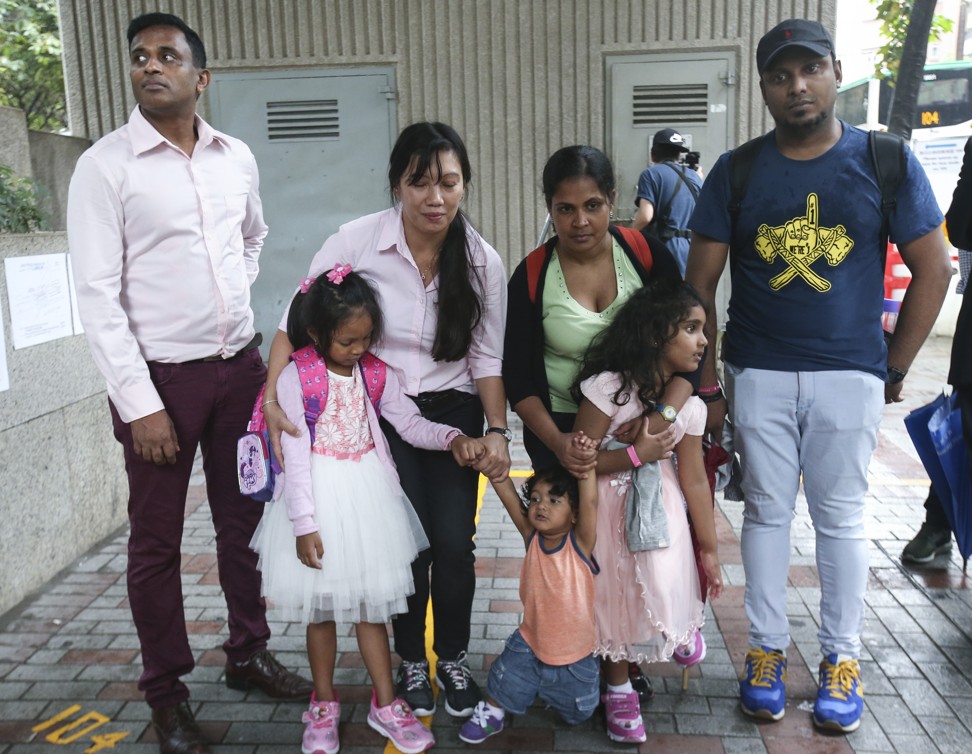
Rejected by Hong Kong, first asylum seekers who sheltered Edward Snowden are granted refugee status by Canada
- Vanessa Rodel, an asylum seeker from the Philippines, and her seven-year-old daughter were due to land in Toronto
- Rodel was among a group of vulnerable asylum seekers who sheltered NSA whistle-blower Edward Snowden while he hid in Hong Kong in 2013
One of the asylum seekers who sheltered Edward Snowden in Hong Kong is on her way to a new life in Montreal, her lawyer said, making her the first of the “Snowden refugees” to find safe haven and the latest high-profile refugee to be welcomed to Canada.
Vanessa Rodel, an asylum seeker from the Philippines, and her seven-year-old daughter Keana are expected to land at Toronto’s Pearson International Airport just before 6pm Monday, then make their way Tuesday to Montreal, where a refugee organisation has raised funds for their resettlement.

For Rodel, landing on Canadian soil will mark the start of a new chapter in a saga that began when she fled sexual violence in the Philippines in 2002 and sought asylum in Hong Kong. Her journey took a spectacular twist in 2013, when her lawyer asked if she might shelter an American in distress – and that American turned out to be Snowden.
After the former National Security Agency contractor outed himself as the whistle-blower who leaked details about US government’s Prism surveillance program, he took shelter with Rodel and asylum seekers living in Hong Kong’s cramped tenements, hiding out for about two weeks until he travelled to Moscow.
In the years since, those who helped him have lived in fear, their supporters said.
Those who helped get Rodel and her daughter out of Hong Kong are thrilled they are now en route to Canada but are concerned that five of the seven asylum seekers linked to Snowden – three adults and two children – have yet to be granted refugee status and were left behind.
“Canada did the right thing,” said Robert Tibbo, the Canadian lawyer who helped Snowden in Hong Kong and is working with Rodel.

“What Trudeau needs to do now is step forward and grant the others refugee status and bring them to Canada,” he said, referring to Canadian Prime Minister Justin Trudeau.
The story of how Rodel crossed paths with Snowden sounds cinematic but the impact on her life has been very real.
After being kidnapped and trafficked by militants, Rodel fled the Philippines, landing in Hong Kong, a wealthy city with a notably poor record of protecting asylum seekers.
In 2013, she was living in the city, waiting on her case, when her lawyer, Tibbo, told her there was an American man in need of help.
Not long before, Snowden had landed in the Chinese special administrative region, camping out at a luxury hotel as he prepared to go public. With his face splashed on newspapers, he went underground, disappearing into the city.
Not much was known about his whereabouts during that period until 2016, when Oliver Stone was set to release a film about him. The movie would show that Snowden stayed with his lawyer’s other clients, moving between modest homes for about two weeks until making it to the airport.
Though Rodel and the others were not named in the film, local media put the pieces together, Tibbo said. He told his clients they had two options: go underground, or go public. They decided that going public would be safer, he said.
The film, Snowden, called global attention to the plight of asylum seekers in Hong Kong but did little to make Rodel or the others feel safe.
After waiting years for hearings, all three cases – Rodel and her daughter, a Sri Lankan couple and their two children, and a Sri Lankan man – were rejected in Hong Kong. They have appealed.

Tibbo, who has faced criticism for his handling of the cases, reached out to colleagues in his native Quebec. A group of lawyers and volunteers there formed a non-profit, For The Refugees, to support the asylum seekers and sponsor them to come to Canada.
Rodel and her daughter’s arrival in Toronto will call fresh attention to Canada’s role as a destination for those fleeing persecution.
At a time when other countries are closing their doors, Canada’s Liberal government has made welcoming vulnerable newcomers a very public priority, sending Trudeau to help Syrian refugees pick out winter gear.
In January, Canada stepped in to help a young Saudi woman who made headlines around the world after fleeing abuse in Saudi Arabia, locking herself in a Bangkok hotel room and posting her pleas for assistance on Twitter.
Many Canadians were proud to see Canada’s foreign minister, Chrystia Freeland, welcome her at the airport, though some wondered why her case appeared to be processed so quickly.
The question of speed will now become central. Snowden, Stone and human rights groups have already urged the Canadian government to act quickly on the other cases. With Rodel on the ground, the Trudeau government will likely face greater pressure to act.
The Quebec team stressed that the five left behind are terrified they will be arrested or sent back to the countries they fled.
“They’ve been living like this for years, in tiny apartments, with no shot at getting out,” said Marc-André Séguin, the Montreal-based immigration attorney who founded For the Refugees. “Right now, they can’t breathe.”

